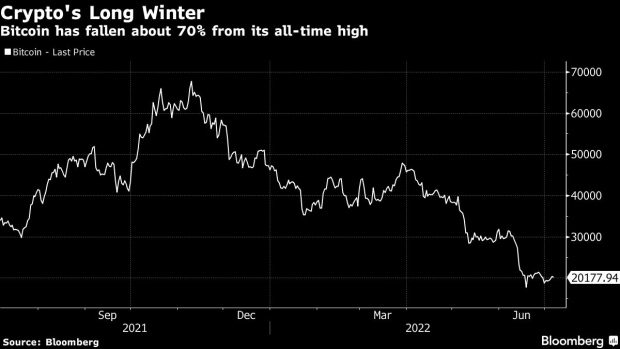Jul 6, 2022
UK’s Crypto Strategy ‘Back to Square One’ as Sunak, Glen Quit
, Bloomberg News

(Bloomberg) -- The UK’s plan to turn itself into a global crypto hub just suffered a major setback, with the initiative’s two most important backers quitting Prime Minister Boris Johnson’s government.
Chancellor of the Exchequer Rishi Sunak and Economic Secretary to the Treasury John Glen were the architects of a campaign launched in April to strengthen the nation’s image as a crypto-friendly jurisdiction. That push came after years of regulatory caution that prompted many crypto companies to relocate elsewhere.
- Listen: Won’t Anyone Think of the UK Crypto Investor? (Podcast)
But after the two quit their positions in Johnson’s cabinet this week in the midst of a political scandal, crypto proponents are concerned that the strategy may fizzle. Sunak and Glen made overtures to the sector in recent months, meeting with executives in an effort to formulate a more cohesive strategy on digital assets.
“You don’t write effective policy without knowing what you’re doing,” said Ian Taylor, the head of British crypto industry group CryptoUK, which regularly engages with politicians on crypto. “We’re back to square one.”
Nadhim Zahawi, the former vaccines minister, will replace Sunak as chancellor, while Glen’s successor has yet to be named. Implementing the crypto push, which included introducing regulation for stablecoins as well as giving new powers to the financial regulator, will likely take longer now as the new ministers get up to speed, Taylor said.
- Take our survey: MLIV Pulse: What Is the Future for All Things Crypto?
The resignations come just as the Financial Services Bill is set to overhaul key parts of the City, and ahead of the July 19 Mansion House dinner, where Sunak was expected to discuss crypto and the UK’s plan for a central bank digital currency, among other things.
Glen was the government’s de facto crypto czar, spearheading efforts to bridge differences between the industry and regulators. Over the past 18 months, he visited cities like San Fransisco, Washington and Madrid to meet with crypto companies and regulators, providing both himself and Sunak with Silicon Valley experience which digital asset leaders believe is key to ministerial education in this area.
“Glen has been a champion of fintech for a long time, relatively speaking, and generally ‘gets’ what’s needed,” said Sarah Kocianski, an independent fintech strategy consultant. “Whoever takes over will likely have a lot less industry experience and that will make filling his shoes harder.”
- Read more: Britain’s Crypto List: Here Are the People to Watch
The European Union last week reached a provisional agreement on its landmark crypto legislation, the Markets in Cryptoassets bill (MiCA), paving the way for common rules across all 27 member states. Other popular crypto destinations like Dubai and Singapore are also putting in place more comprehensive regulatory frameworks, enticing businesses to set up away from British shores.
Sunak’s and Glen’s successors will also have to contend with divisions within the country on how to handle crypto. The Bank of England said in its July financial stability report that the industry requires tougher rules, with “extreme volatility” in recent months revealing fundamental weaknesses in the crypto market.
“There’s still a lot of interest inside the Conservative party for making the UK a crypto hub,” said Stephen Diehl, a software engineer and crypto skeptic who advises European governments on digital asset policy. “But even in government there’s still a lot of debate.” BOE Governor Andrew Bailey and his staff “seem to be the other faction that’s more opposed.”
©2022 Bloomberg L.P.





